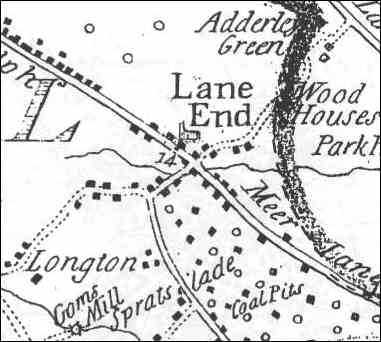|

from William Yates map of
1775 |
Lane End,
Longton, Stoke-on-Trent, Staffordshire.
Confusion often arises over the
location and names of Lane End and Longton. Originally they were two
separate and contiguous townships which were incorporated in the of
Borough of Longton in 1865.
Longton was
adjacent to Longton Hall and encompassed the Longton Hall Colliery and
Brickworks. Even in 1900 the area was mainly fields.
Lane End was
centred on the area around Market Street and the bottom part of Anchor
Road and contained the Markets, Churches and main potworks.
|
"LANE END, a populous and thriving market-town, and
with LONGTON, forms an extensive township, situated five miles south-east
of Newcastle, at the southern extremity of the Potteries, and has risen in
a few years by the almost magical influence of a prosperous manufacture to
a respectable degree of opulence."
From:
Pigot & Co's 1828/9 Directory
of Staffordshire
 on Lane End
on Lane End

The Crown & Anchor Inn
(now Crown Hotel), by the railway bridge
in Lane End
The Inn on
the left where in 1832 the Chartist rioters smashed the windows
and through the railway bridge can be seen the Town Hall where Mr.
Davenport
(parliamentary candidate) and his committee had to seek refuge.
 on Chartism in the
Potteries
on Chartism in the
Potteries
|